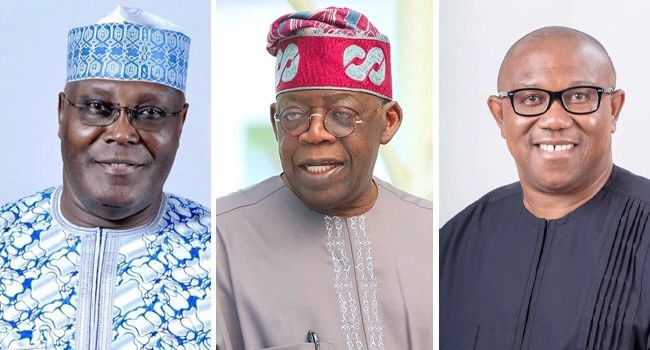The protracted legal battle between President Bola Ahmed Tinubu, Alhaji Atiku Abubakar, and Peter Obi has, at long last, reached its zenith, following the Supreme Court’s unwavering verdict, which upheld Bola Ahmed Tinubu as the legitimate victor of the February 25, 2023, Presidential election.
The election bore witness to fierce competition among the three major political parties: Alhaji Atiku Abubakar, representing the People’s Democratic Party; Peter Obi as the standard-bearer of the Labour Party; and Bola Ahmed Tinubu, leading the charge for the All Progressives Congress. The election was keenly contested, with supporters from each political camp steadfastly believing in their respective victories at the polls.
Historically, presidential elections in Nigeria since 1999 have featured a duopoly, often pitting the ruling party against a single opposition party. While sporadic attempts at introducing a third political force have been made in the past with limited success, Mr. Peter Obi of the Labour Party uniquely managed to rally his followers and put up a robust fight in this three-way contest.
The election brought with it a series of unexpected twists and turns, most notably the currency redesign initiated to counter the issue of vote buying and selling, as the then CBN Governor, Godwin Emefiele alleged. It was indeed, an arduous experience that leveled the playing field, blurring the line between the haves and have-nots. Even the privileged struggled to access their funds in their bank accounts. The associated hardships prompted then-APC candidate, President Bola Ahmed Tinubu, to voice his concerns during campaign rallies. Nevertheless, he remained optimistic about his victory despite the currency redesign controversy and eventually emerged victorious.
Our resilience as Nigerians is remarkable, as we’ve moved past that era as if it had never happened. This testament to our ability to persevere in the face of adversity, turning predicaments into strengths, shows our collective commitment to charting a new and promising path forward.
Turning to the presidential election itself, immediately after the Independent National Electoral Commission declared Bola Ahmed Tinubu as the winner of the fiercely contested election, the two opposition candidates held a press conference to reject the result and vowed to challenge it in court. In Nigeria, elections typically don’t end at the polls; they often extend to the courts, where Supreme Court Justices have the final say. However, as the old legal maxim goes, “In every general rule, there is an exception,” and this exception was vividly demonstrated in 2015 when the then-sitting President, Goodluck Ebele Jonathan, made the unprecedented decision to accept defeat to PMB of the APC without resorting to a legal challenge. His famous quote, “My ambition is not worth the blood of anybody,” still resonates today, earning him accolades and a pan-African status.
This is not to imply that Atiku and Obi were wrong to have sought redress in court, as every aggrieved Nigerian has the explicit right to do so. Section 239 of the Nigerian Constitution provides for the establishment of election tribunals to hear and determine petitions challenging the results of elections to various offices, including the offices of the President, Governors, National Assembly members, and State House of Assembly members.
There is no denying the fact that the 2023 presidential election Tribunal, stands out among Election Petition Tribunals the country has ever witnessed. Supporters of the various political parties came out in full force to support their candidates. The Tribunal Judges at the temple of Justice were reminded of the watchful eyes of citizens, as evidenced by the “all eyes on the judiciary” banner. This controversy was unprecedented in the history of Nigeria’s nascent democracy and raised concerns of a possible breakdown of law and order. Thanks to our dedicated security personnel, who were stretched thin but managed to prove their mettle, law and order were upheld, and the situation didn’t escalate.
Now, with the finality of the Supreme Court’s verdict, it is imperative that we come together as a nation and work toward our country’s growth. While it can be challenging to move forward after a presidential election defeat, if our intention is to make Nigeria a better place, there’s no better time to sheath our swords and assist Mr. President in achieving his renewed hope mandate for Nigeria. The essence of democracy lies in periodic elections, allowing those who suffered defeats in 2023 to return to the drawing board and strategize for the next election. However, in this process, we must not forget that this country is all we have, and we should refrain from actions that could jeopardize our corporate existence as a nation.
READ ALSO: Is it right for the judiciary to tell us who won or lost the election? — Bode George



